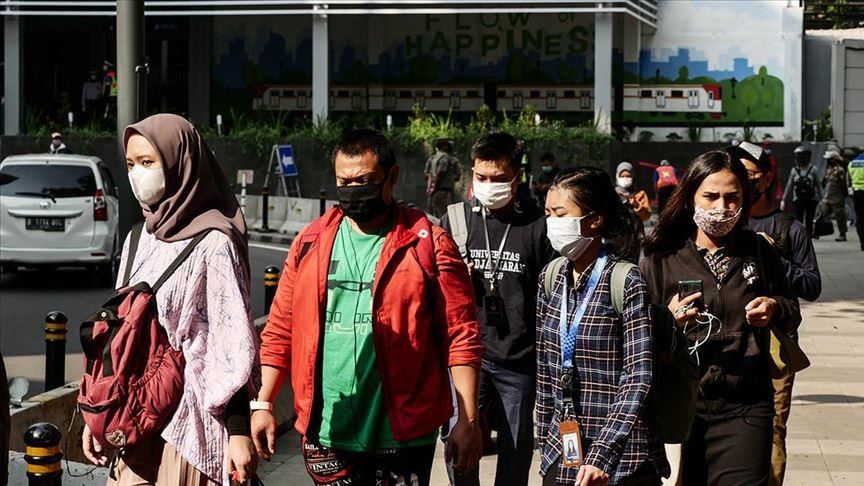Indonesia: Experts call for effective COVID-19 measures
Southeast Asian nation confirms total of 68,079 coronavirus cases, with 3,359 fatalities as of Wednesday

JAKARTA
Indonesia remains the country with highest COVID-19 infections in Southeast Asia.
As of Wednesday, 68,079 cases were reported in the country, while death toll reached 3,359, according to health authorities.
Based on data collected by Indonesian COVID-19 Task Force, the average daily infection rate reached more than 1,000 a day.
Dewi Nur Aisyah, a member of the task force, claimed on Wednesday the surge in the number of cases does not mean the situation has worsened nationwide.
In a news conference, Aisyah said the task force had mapped all regions in Indonesia based on the level of risk, divided them into green zones (lowest risk), yellow zones, orange zones and red zones (highest risk).
"COVID-19 transmissions in all 514 regencies and cities in Indonesia are not the same so it cannot be generalized that all areas have high number of cases," she maintained.
Aisyah noted that mapping results show that only 12 regencies and cities confirmed more than 1,000 cases, including the capital Jakarta and the country’s second biggest city Surabaya.
A total of 38 regencies and cities confirmed 200 to 1,000 cases of COVID-19, while 61 others have zero infection and have been categorized as green zones.
"But being a green zone does not mean that it is completely safe, there are still risks," she added.
The task force claimed the country’s positivity rate dropped despite reporting of more than 1,000 new cases daily.
It said a surge in cases was due to increased testing from an average of 10,000 tests daily in May to an average of 20,000 tests a day in June.
In mid-May, there were 3,448 people tested positive for the coronavirus in a week, with only 26,000 people tested, bringing positivity rate to 13 percent.
Meanwhile, in June, there was an average of 8,000 new cases confirmed weekly, while the number of people tested reached 55,000, taking the positivity rate to 12 percent.
"So, this cannot be rated only based on the number of new cases per day, but also the number of people tested," she noted.
Potentially getting worse
Laura Navika Yamani, a public health expert from Airlangga University in East Java province, told Anadolu Agency that the number of coronavirus cases in the country climbed as test capacity increased.
According to the task force’s figures, the total number of specimens tested reached 946,054.
"Previously, the number of testing was very small, now it has increased consistently," said Yamani.
However, she noted some areas have eased their coronavirus restrictions amid rise in number of infections.
Yamani warned that this situation would likely worsen virus transmission in Indonesia.
"People’s movement is no longer restricted, there are more sources of transmission," she said, adding that it is not safe yet to impose new normal in the country.
The expert also called on government to improve health facilities as the number of infections continued to rise.
"Are our health facilities ready? Look at the hospitals in Surabaya city, they are overwhelmed," she added.
Flexible measures
Meanwhile, Yanuardi Syukur, a public policy expert from Khairun University in North Maluku province, highlighted some people refused to avoid unnecessary travel and gathering amid the pandemic.
“The government was facing problems to impose lockdown given our weakening economy,” Syukur told Anadolu Agency.
He said that flexible measures were imposed in the country as a “middle ground.”
"The awareness of all parties to comply with social order by following the health protocol is needed," said Syukur.
“The government is not working optimally to stop the COVID-19 pandemic,” he added.
In a video released last month, Indonesian President Joko Widodo said he would resort to a Cabinet reshuffle, disband government bodies or issue another regulation if ministers failed to effectively deal with the pandemic and its economic impact.
He added that a reshuffle is an option for president to ensure that government promptly serves the needs of the people.
*Writing by Rhany Chairunissa Rufinaldo from Anadolu Agency's Indonesian language services in Jakarta.
Anadolu Agency website contains only a portion of the news stories offered to subscribers in the AA News Broadcasting System (HAS), and in summarized form. Please contact us for subscription options.







